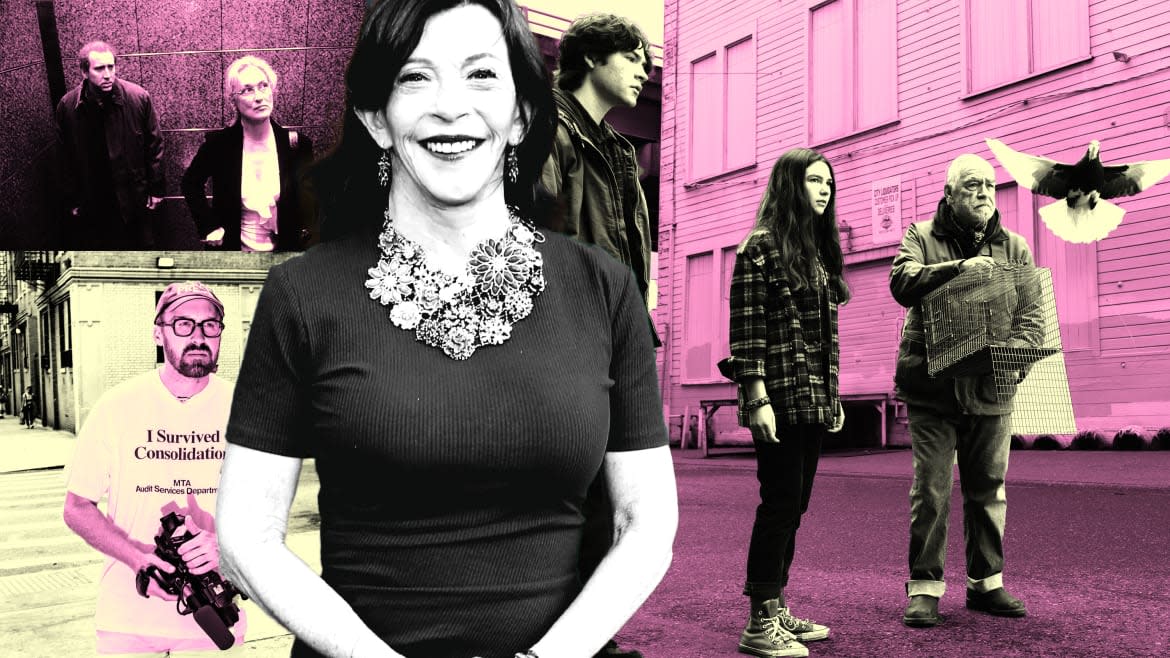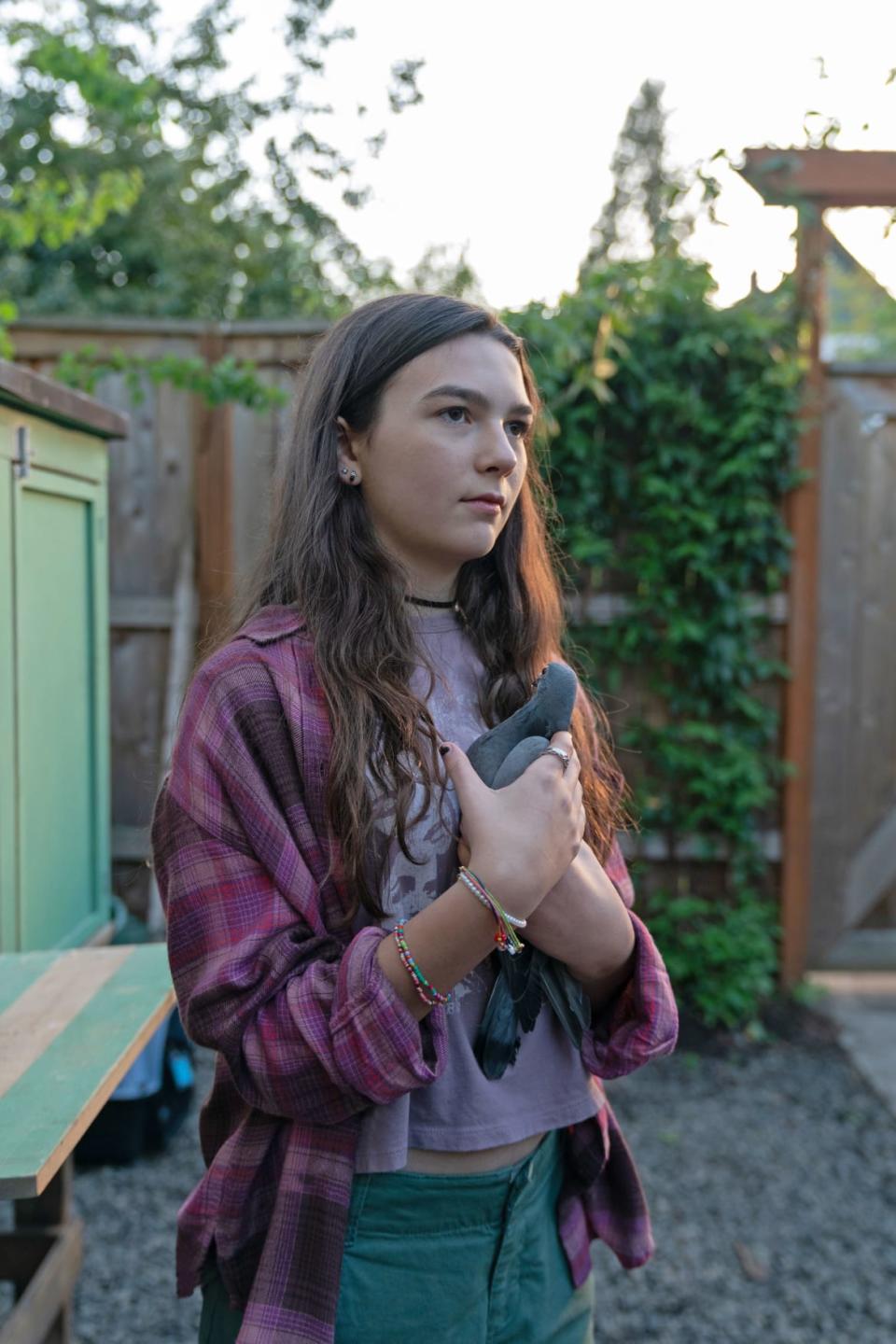Why One of the Weirdest Adaptations Ever Is Actually Perfect

- Oops!Something went wrong.Please try again later.
- Oops!Something went wrong.Please try again later.
- Oops!Something went wrong.Please try again later.
Susan Orlean may be best known to a large swath of cinephiles less for her work and more for the adaptations of it—namely Adaptation, Charlie Kaufman’s Oscar-winning 2002 film. It’s one of the more unique films of the 21st century, a meta-comedy written by and about Charlie Kaufman (played by Nicolas Cage in the film). In theory, it’s drawn from Orlean’s popular 1998 nonfiction book The Orchid Thief, a loosely structured investigation into the arrest of a group of flower poachers. In practice, it’s an exercise in conquering writer's block, with Kaufman mocking his own failed attempt to translate this challenging text into a coherent narrative. And, for good measure, Susan Orlean herself is a major character, played by Meryl Streep, who ends up falling for one of the criminals featured in her book.
It’s a doozy of a picture, and hard to believe that it has anything in common with the actual Orchid Thief. It may also give the impression that Orlean’s writing resists standard storytelling. But more than 20 years later, another adaptation of her writing challenges that notion. Little Wing, now streaming on Paramount+, draws from Orlean’s 2006 New Yorker article of the same name. From the way the film tells it, it’s a straightforward story about a preteen named Kat (Brooklynn Prince) whose reluctance to move out of her childhood home pushes her toward the expensive, seedy underbelly of pigeon racing. But as she hunts for a prized pigeon to make a buck off on the resale market in order to help her mom pay off their house, she ends up falling in love with both the sport and the bird—and coming to terms on the many meanings of “home.”
Orlean’s original “Little Wing” follows many of the same beats, with slightly lower dramatic stakes. (There’s no thievery in her piece, nor is there a standoff with pigeon-loving mobsters.) But, in a recent interview with The Daily Beast’s Obsessed, Orlean says she appreciates the changes—just as she appreciates the singular weirdness of Adaptation.
Below, Orleans talks about the long road that Little Wing took from page to screen, the lessons she learned while writing for the indescribable TV series How to With John Wilson, and why Adaptation is actually a perfect adaptation of her work.

Brooklynn Prince as Kaitlyn in 'Little Wing.'
What initially interested you about this story?
I’m very interested in subcultures, and this was one that I had no idea existed. The more I learned about it, the more fascinating it became. Pigeons are really interesting, and there’s a lot of history that's really fascinating about the way they've been used. Then there was this particular poignancy of this little girl [12-year-old Sedona in the article; Kat in the film] who had found comfort in this sport, and now her family was moving, and she was going to have to contend with this very profound, emotional fact of these birds not being able to learn a new home, which was quite obviously her big worry for herself too.
It just was almost immediate—like when you hear about a story and you go, “Of course, this is a story.”
How involved were you with the adaptation, including the changes made from Sedona’s story to Kat’s story?
The story got optioned immediately. It’s one of the few stories I’ve written where I could immediately see it as a movie, and partly because it's very visual. The birds are beautiful, and the birds flying are so visual. This is partly why I always find it interesting that I’ve had a fair number of stories optioned for film—because I’m not trying to write a film, and the demands of what makes a good piece of narrative nonfiction are really different from a movie. There doesn’t have to be this dramatic arc that a movie seems to require.
[But getting Little Wing made] was a real saga. I mean, the story was written 17 years ago, and [writer John Gatins] was done with it in a fairly short amount of time. So I saw the script then, and then it entered this period of extreme Hollywood turmoil, because the division of Paramount for which it had been optioned eventually dissolved, and there was a lot of ill will, and a lot of projects got shelved. I stayed out of it. I just felt like, “Look, who knows what's going to happen?”
Not only have several of your own works been adapted for the screen—despite your own surprise about that—but you’ve written for TV before too. What did you learn about the difference between narrative nonfiction and nonfiction TV from your experience working on How to With John Wilson, where you were part of the writers’ room for two seasons?
Writing for that show was so unique. I don’t think you could say, “I wrote for How to With John Wilson, so now I understand the conventions of screenwriting.” He explodes the whole idea of the way narrative can evolve. And I think that that’s why he did reach out to me, because I think he felt my resistance to the ordinary demands of a narrative were very inspiring to him. I understood how he didn’t feel like he needed to hit all the beats of a typical Hollywood story.
Not at all.
As somebody who writes for the page, any time you write for television or film, you learn a lot about the economy of language vs. writing it all out on the page. You don’t have to describe anything, or explain how somebody walked from one room to another room. They just do it. It’s a combination of feeling like you had your legs cut off and then feeling very liberated.
How did writing for such a specific show like John Wilson, which is a mix of documentary and narrative nonfiction, actually work?
It was not easy. He had this giant resource of film that he had already captured, so we were structuring the show knowing that he had all of this [footage]. It was, in that sense, structured more the way I write my stories, which is that I do the reporting in advance, and then I figure out what I’m going to use or not use, or how this will segue into that.
How Anthony Boyle Became ‘Maniacal Racist’ Assassin John Wilkes Booth
But then also there would be these holes where we’d say, “We need somehow to get from the guy with the penis extension to the guy with the rug. What could work there?” And then we would brainstorm about how maybe it would be X or maybe it would be Y. …Then there would be times where [John] would say, “Well, I definitely am going to go on a trip to this convention, but who knows what we’re going to get! So let’s build a slot in the structure of the show where I’m going to go to the convention.” It was really challenging.
That sounds uniquely difficult. And thank you for referencing the episode featuring the man who was trying to regrow his foreskin—that was maybe the best one.
When I saw that episode, I literally screamed, because it was so insane. The absurdity [of John Wilson] was so amazing.
I have to give HBO credit for commissioning the show. This was not at all traditional in any way, and the love people had for it shows you that people do have an appetite for things that are unconventional. I don't give viewers or readers enough credit for that. They are interested in things that don't fit the conventional format. I mean, I hope they are, because that's certainly the way I write.
Speaking of unconventional—it is wild that a movie as idiosyncratic as Adaptation is technically based on one of your books, The Orchid Thief.
In a way, that film addresses this absolutely head-on. I didn’t write a book that had a Hollywood arc, and when it was optioned, I thought, “I have no idea how you’d make it into a movie.” I wrote the book I wanted to write, which was not conventional. I don’t even get to see the thing that the whole book is about [the rare orchid].
When people say that Adaptation isn’t really like my book, I think, “Actually, it really is.” It addresses the nature of the book in a more sincere way than I expected—the fact of it being not a conventional story.
So you were happy with the film’s take on your book?
Oh, I love it. I mean, in the beginning, when I first read the script, I was very puzzled. I just thought, “What the hell are you people doing?” But I love the movie. It’s just one of the great movies of the postmodern era, and I feel that it was really true to the heart of the book in a way that a conventional movie wouldn’t have been. It’s one of those movies that people still actively watch all the time. I hardly meet anyone who hasn’t seen it.
Despite being such a strange movie, like most of Charlie Kaufman’s movies, its popularity really does prove your hypothesis that people have more of a tolerance for nontraditional stories than Hollywood tends to think.
Yeah, I absolutely think that’s the case. It’s a hard sell, almost more so with movies and television, because it’s so expensive to make TV and movies. I think you have a little more freedom publishing a book, because it’s you and your laptop, and it doesn’t involve millions of dollars banking on the audience being able to understand what you’re doing.
The Story Behind the Best Episode of ‘Girls5eva’ Season 3
I write the stories I want to write, and I don’t anticipate or wonder, “Will this be optioned?” I’m not a movie producer. Some of the stuff that gets optioned is the stuff that’s the most challenging, where I think, “Wow, that’s so cool that someone is going to take this eccentric story and they really see a movie in it.” I’m really lucky. I have had really cool people interested in adapting my work.
Definitely. Not a lot of people can say that Charlie Kaufman adapted their book, especially like that!
Exactly. I was willing to roll along with it, which, I’ve got to say, maybe not everybody would have been willing to sign off on that project. But I just thought, “It’s very nutty, but let’s see what happens.”
This interview has been edited and condensed for clarity.
Get the Daily Beast's biggest scoops and scandals delivered right to your inbox. Sign up now.
Stay informed and gain unlimited access to the Daily Beast's unmatched reporting. Subscribe now.

